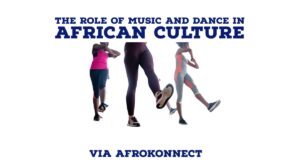Welcome to this post about The Role of Music and Dance in African Culture, via Afrokonnect. As vital to culture as sports, betting, music or dance are part of daily life across Africa. These art forms are vital in African communities. They connect generations through shared stories, rhythms, and movements. They express histories, values, and beliefs. African music and dance are powerful symbols of identity. They show resilience and unity. This includes traditional drumming, Afrobeat, and hip-hop. They provide a space for personal expression and social connection.
Traditional Roots: Music as Communication and Ritual
In traditional African communities, music is more than entertainment. It is a language and a way of life. Every movement, beat, and sound has value and purpose. They often commemorate events, honor deities, and convey messages. Traditional instruments, like drums, rattles, flutes, and xylophones, are vital to ceremonies. They are key to rituals, too. They also produce rhythm. For example, the West African djembe drum has spiritual and emotional beats. They are used to mark weddings, funerals, and harvest festivals.
Chanting and drumming circles are often used in stories and rituals. They are also used in social events. The group’s dances and repetitive beats create a communal energy. This fosters a sense of solidarity and belonging. Many African countries have diverse tribes. Each has unique dance and music traditions. They reflect the tribes’ histories, cultures, and spiritual beliefs. The Igbo of Nigeria use the “Atilogwu” dance to show agility and excitement at festivals. The Maasai of East Africa use their “Adumu” dance in rituals to symbolize power and endurance.
Dance as a Symbol of Unity and Identity
African dance is a storytelling art form that goes beyond just physical movement. Dancing lets people and communities express their feelings, ideals, and identity. All ages and genders can join in dance. It is a communal practice in African communities. It promotes cultural values and social unity. For example, dance is a teaching tool in youth initiation rites. It imparts virtues like resilience, respect, and responsibility.
Every dance has a distinct social purpose and meaning. Some cultures classify dances by their functions. They have harvest, courting, and war dances. The Zulu “Indlamu” dance, which is celebrated in Southern Africa, is distinguished by its warrior garb and stomping motions. Like this, the Shona people of Zimbabwe dance to Mbira music. Their dances are tied to ancestral spirits. This shows how dance connects people to their past and present.
Contemporary African Music: The Rise of Afrobeat and Hip-Hop
In recent decades, Africa has had a musical revolution. Afropop, hip-hop, and Afrobeat are now globally popular. African musicians can now blend traditional elements with modern beats. This has created a sound that is popular at home and abroad. Nigerian artist Fela Kuti popularized Afrobeat. It blends jazz, funk, and highlife with traditional African rhythms. His music was avant-garde. It also opposed government corruption and promoted human rights. It served as a platform for social and political engagement.
Afrobeat is still evolving today. Singers like Burna Boy, Wizkid, and Yemi Alade are incorporating modern topics and working with global stars. African artists now use the genre to promote African culture. They want to share their experiences, struggles, and goals. Hip-hop fuses Western beats with African lyrics and themes. It has become popular among African youth for expressing social and political concerns. For instance, South African hip-hop artists Nasty C and Sho Madjozi connect with global audiences. They address identity, social justice, and resilience.
The Role of Dance in Contemporary African Culture
African dancing has become as popular around the world as its music. Dance styles like Ghanaian Azonto, South African Gwara Gwara, and Nigerian Shaku Shaku have gained fame on Instagram and TikTok. These dances have their roots in traditional African movements. They were modified for modern settings, fostering global cultural exchange.
Young people can express their identities via contemporary African dance in a way that respects their tradition while embracing contemporary influences. Dance battles, workshops, and street performances are popular in many African cities. They give young people a way to express themselves and be creative. They also satisfy their competitive spirit. Furthermore, African diasporic communities around the world now heavily include contemporary dance, which helps them embrace new cultural landscapes while maintaining ties to their heritage.
Music and Dance as Agents of Social Change

In Africa, dance and music have also developed into effective instruments for advocacy and social transformation. Many African musicians use their platforms to advocate for social causes. These include inequality, poverty, health issues, and environmental problems. Musicians like Hugh Masekela and Miriam Makeba became symbols of resistance and hope during South Africa’s apartheid era. They used their music to oppose racial segregation and promote freedom. Artists today use their music to address societal issues. They encourage young Africans to speak out and push for reform.
All things considered, dancing and music are not only forms of artistic expression in African culture; they are essential components of identity, resiliency, and solidarity. Afrobeat and hip-hop reflect modern African experiences. They express current hopes. But, traditional music and dance preserve heritage and ideals. African music and dance shape world culture. They blend traditional roots with modern forms. This fusion creates a vibrant story that honors the continent’s past, present, and future. Africans use art to share their stories, confront challenges, and build community. This shows the continued importance of dance and music in the continent’s culture.
















[…] to this post about the Fastest Growing Movie industries in Africa, via Afrokonnect. Over the last few years, Africa has exported various talented actors and […]